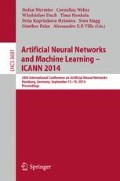Abstract
Sensitivity analysis became an acknowledged tool used to study the performance of artificial neural networks. Sensitivity analysis allows to assess the influence, e.g., of each neuron or weight on the final network output. In particular various feature selection and pruning strategies are based on this capability. In this paper, we will present a new approximative sensitivity-based training algorithm yielding robust neural networks with generalization capabilities comparable to its exact analytical counterpart, yet much faster.
Access this chapter
Tax calculation will be finalised at checkout
Purchases are for personal use only
Preview
Unable to display preview. Download preview PDF.
References
Castillo, E., Guijarro-Berdiñas, B., Fontenla-Romero, O., Alonso-Betanzos, A.: A very fast learning method for neural networks based on sensitivity analysis. Journal of Machine Learning Research 7, 1159–1182 (2006)
Dias, F.M., Antunes, A.: Test error versus training error in artificial neural networks for systems affected by noise. Int. J. of Systems Engineering, Applications and Development 2(3), 83–90 (2008)
Møller, M.: A scaled conjugate gradient algorithm for fast supervised learning. Neural Networks 6, 525–533 (1993)
Mrázová, I., Reitermanová, Z.: A new sensitivity-based pruning technique for feed-forward neural networks that improves generalization. In: IJCNN 2011, pp. 2143–2150. IEEE, New York (2011)
Mrázová, I., Reitermanová, Z.: Sensitivity-based SCG-training of BP-networks. Procedia Computer Science 6, 177–182 (2011)
Mrázová, I., Wang, D.: Improved generalization of neural classifiers with enforced internal representation. Neurocomputing 70(16-18), 2940–2952 (2007)
The World Bank Group: World development report 2007/2008. Washington (2008)
Yeh, I.C., Cheng, W.L.: First and second order sensitivity analysis of MLP. Neurocomputing 73, 2225–2233 (2010)
Zhong, A., Zeng, X., Wu, S., Han, L.: Sensitivity-based adaptive learning rules for binary feedforward neural networks. IEEE Transactions on Neural Networks and Learning Systems 23(3), 480–491 (2012)
Author information
Authors and Affiliations
Editor information
Editors and Affiliations
Rights and permissions
Copyright information
© 2014 Springer International Publishing Switzerland
About this paper
Cite this paper
Mrázová, I., Petříčková, Z. (2014). Fast Sensitivity-Based Training of BP-Networks. In: Wermter, S., et al. Artificial Neural Networks and Machine Learning – ICANN 2014. ICANN 2014. Lecture Notes in Computer Science, vol 8681. Springer, Cham. https://doi.org/10.1007/978-3-319-11179-7_64
Download citation
DOI: https://doi.org/10.1007/978-3-319-11179-7_64
Publisher Name: Springer, Cham
Print ISBN: 978-3-319-11178-0
Online ISBN: 978-3-319-11179-7
eBook Packages: Computer ScienceComputer Science (R0)

